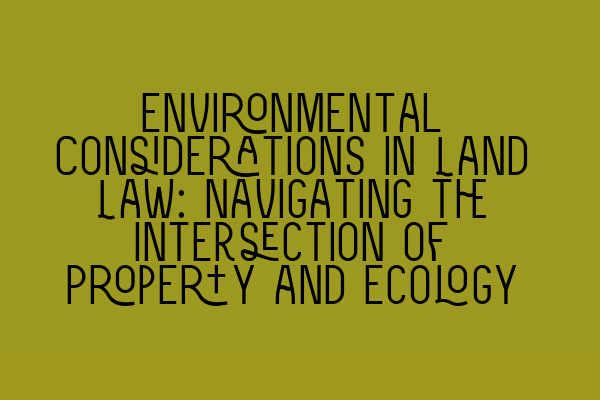Environmental Considerations in Land Law: Navigating the Intersection of Property and Ecology
At SQE Property Law & Land Law, we understand the importance of environmental considerations in today’s legal landscape. As solicitors, writers, and SEO experts, we recognize the need to navigate the intersection of property and ecology effectively. In this blog post, we will explore the key environmental factors that impact land law and discuss how you can approach these considerations in your legal practice.
The Environmental Impact Assessment in Land Transactions
An essential aspect of land law is conducting an environmental impact assessment (EIA) for land transactions. An EIA is a process that evaluates the potential adverse effects a project may have on the environment. It allows for the identification, assessment, and mitigation of any environmental risks and helps ensure sustainable development.
Having a thorough understanding of the EIA process is crucial for any property lawyer. From identifying potential environmental concerns to advising clients on compliance with environmental regulations, being well-versed in this area of law can significantly benefit your clients and protect their interests. If you want to test your knowledge on EIA, check out our SQE 1 Practice Exam Questions.
Covenants and Restrictions to Promote Environmental Sustainability
Covenants and restrictions are legal instruments used in land law to regulate land use and ensure sustainable development. These instruments can play a vital role in promoting environmental sustainability by setting standards for landowners, developers, and tenants.
When drafting covenants and restrictions, it is essential to consider the potential impact on the environment. This could include limitations on deforestation, regulations on water usage, or requirements for the use of eco-friendly building materials. Understanding the latest environmental legislation and incorporating it into these legal agreements is key. If you want to deepen your understanding of land law and its environmental considerations, consider enrolling in our SQE 2 Preparation Courses.
Adapting Land Law for Climate Change Challenges
As climate change continues to shape our planet, land law must also adapt to the new challenges it presents. Rising sea levels, extreme weather events, and changing ecological landscapes have a direct impact on property rights and land use.
Property lawyers must stay informed about how climate change affects land rights and land transactions. This includes understanding the legal implications of encroaching coastlines, potential claims for compensation due to climate-related damage, and the legal framework for renewable energy projects. To ensure you are prepared for these challenges, explore our SQE 1 Preparation Courses.
Conclusion
Environmental considerations are an integral part of the practice of land law. It is essential for property lawyers to navigate the intersection of property and ecology to provide comprehensive legal services to their clients. By understanding the environmental impact assessment process, incorporating environmental considerations into covenants and restrictions, and staying informed about climate change challenges, you can effectively address these issues in your legal practice.
If you are interested in learning more about SQE exams, explore our SRA SQE Exam Dates. For practice resources and mock exams, check out our SQE 1 Practice Mocks FLK1 FLK2.
